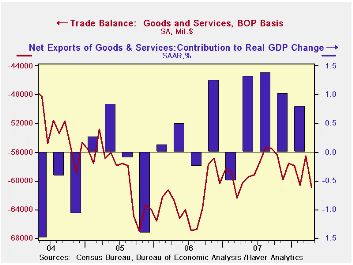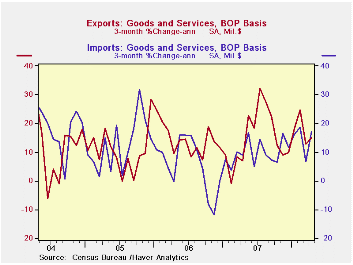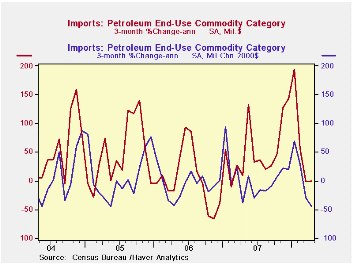 Global| Jun 10 2008
Global| Jun 10 2008U.S. Trade Deficit Deeper in April, Prior Deficits Revised Shallower
by:Tom Moeller
|in:Economy in Brief
Summary
The U.S. foreign trade deficit deepened to $60.9B in April. A $59.7B figure had been generally expected and March's deficit was revised shallower to $56.5B. Benchmark revisions to the seasonally adjusted figures back to 2005, and the [...]

The U.S. foreign trade deficit deepened to $60.9B in April. A $59.7B figure had been generally expected and March's deficit was revised shallower to $56.5B. Benchmark revisions to the seasonally adjusted figures back to 2005, and the not seasonally adjusted data to 2007, generally lowered the trade deficit. Exports were revised up slightly due to raised estimates for services.
U.S. exports rebounded 3.3% in April following their 1.9% March decline. At an annual rate exports during the last three months rose 15.0%. While that was improved from 13.0% growth last year, it actually is down from 32.3% growth last summer.
Goods exports surged 4.5% in April and in chained dollars they
also jumped by 4.5% (11.3% y/y). That recovered virtually all of the
4.7% March decline. Chained dollar exports of nonauto consumer goods
bounced back after March's decline and surged 6.1% (10.0% y/y). Exports
of capital goods more than recovered the prior month's drop with a 5.5%
(13.9% y/y) pop as exports of civilian aircraft (in nominal terms)
surged 23.8% (33.0% y/y). That rise did not, however, recover declines
during the prior several months. Nominal exports of computers also
surged 13.9% (20.6% y/y).
Exports of services rose 0.9% (17.0% y/y) as travel exports rose 0.7% (19.5% y/y) and passenger fares rose 1.0% (25.4% y/y).
Higher oil prices again raised petroleum imports in April by
12.1%. Adjusted for those higher prices, however, petroleum imports
rose just 3.9% (-4.2% y/y) and for all of this year so far the volume
is down 2.6% from the annual peak for all of 2005. The average cost for
a barrel of crude oil was $96.81 in April.
Month-to-month, a 3.5% rise in imports of nonpetroleum products recovered the prior month's decline. However, measured in chained 2000 dollars these imports rose only 2.6% after a 4.0% March drop and the y/y gain was barely positive following a reduced 2.6% increase in 2007. Also in chained dollars, imports of capital goods rose 2.7% (6.5% y/y), about equal to last year's full year growth. Chained imports of nonauto consumer goods did rise 1.6% but they were down 0.3% from last April. Real imports of automotive vehicles & parts surged 4.6% but they were down 3.0% from last year.
Services imports nudged up 0.9% (10.2% y/y). Travel imports increased 0.8% (11.1% y/y) and passenger fares increased 1.6% (19.9% y/y).
With China, the U.S. trade deficit in goods deteriorated sharply m/m to $20.3B. That was the deepest deficit since January, but so far this year the U.S. trade deficit with China averaged $18.7B per month versus a $21.2B monthly average last year. Exports to China rose in April 19.4% y/y and imports rose a moderate 6.9% which, due to slower U.S. economic growth, is down from an 11.7% increase last year. Imports from China rose 18.2% in 2006 and the annual gains exceeded 20% back to 2003.
Outstanding Issues in the Analysis of Inflation is yesterday's speech by Fed Chairman Ben S. Bernanke and it is available here.
| Foreign Trade | April | March | Y/Y | 2007 | 2006 | 2005 |
|---|---|---|---|---|---|---|
| U.S. Trade Deficit | $60.9B | $56.5B | $60.3B (4/07) | $700.3 | $753.3 | $711.6B |
| Exports - Goods & Services | 3.3% | -1.9% | 19.2% | 13.0% | 13.5% | 10.6% |
| Imports - Goods & Services | 4.5% | -3.3% | 13.5% | 6.1% | 10.8% | 12.8% |
| Petroleum | 12.1% | -7.5% | 55.8% | 9.4% | 20.1% | 39.6% |
| Nonpetroleum Goods | 3.5% | -3.0% | 6.0% | 4.8% | 9.1% | 10.3% |
Tom Moeller
AuthorMore in Author Profile »Prior to joining Haver Analytics in 2000, Mr. Moeller worked as the Economist at Chancellor Capital Management from 1985 to 1999. There, he developed comprehensive economic forecasts and interpreted economic data for equity and fixed income portfolio managers. Also at Chancellor, Mr. Moeller worked as an equity analyst and was responsible for researching and rating companies in the economically sensitive automobile and housing industries for investment in Chancellor’s equity portfolio. Prior to joining Chancellor, Mr. Moeller was an Economist at Citibank from 1979 to 1984. He also analyzed pricing behavior in the metals industry for the Council on Wage and Price Stability in Washington, D.C. In 1999, Mr. Moeller received the award for most accurate forecast from the Forecasters' Club of New York. From 1990 to 1992 he was President of the New York Association for Business Economists. Mr. Moeller earned an M.B.A. in Finance from Fordham University, where he graduated in 1987. He holds a Bachelor of Arts in Economics from George Washington University.
More Economy in Brief
 Global| Feb 05 2026
Global| Feb 05 2026Charts of the Week: Balanced Policy, Resilient Data and AI Narratives
by:Andrew Cates






